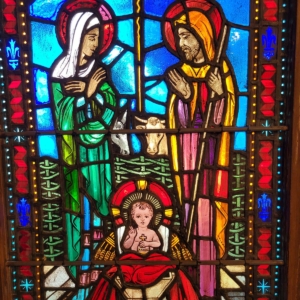Magnificat of a Prodigal
“I baptize you in the Name of the Father, and the Son, and the Holy Spirit,” the priest said, making the sign of the Cross on the baby, a newborn not expected to live, and marking her forever as Christ’s own.
My urgent baptism the day I was born was probably the greatest gift my parents ever gave me. It lit a flame within me that oftentimes seemed to flicker dimly yet refused to be extinguished. As I wandered aimlessly and recklessly through the next decades, the grace I received at my baptistm acted as a homing device to bring me back to the true home and true faith that stirred inside of me.
I am a prodigal daughter, one who strayed long and far. One who thought she could grab her inheritance early and do better with it out in the world than within her Father’s house. Like the older son of the parable, I ended up metaphorically broken, dirty, and perishing from hunger.
We were a family that was Catholic, but not a Catholic family; an obligation passed down through my mother’s side. We knew about Catholic things―prayers, holy days, the pope―but as a family, we did not practice the Catholic faith. Culturally, the 1970s was an age of rebellion―not obedience―to tradition, ritual, and authority. Catholicism was an easy scapegoat. I was drawn to the mysticism, the precision of the rituals, and the stories told in the stained glass, but I didn’t understand any of it. I was curious about the people honored with statues but didn’t know them either, save Jesus, Mary, and Joseph. The old churches with their intricate architecture beckoned and the modern ones reflected messages around me that this faith was nothing to love. So many seemed to hate it, and I followed along.
While still going through the required CCD and Sunday motions, I became ABC: Anything But Catholic. How about Hinduism, Buddhism, Judaism? Then other eastern philosophies and exploration into yoga. I read enough to pick and choose what worked for me. Occult, New Age, and pursuit of worldly goals led to darker passageways and heavier sins, but there was always some flash, some small ray kindling in me that kept me from journeying as deep into the darkness that had captured many of my friends.
He has come to the help of his servant … he has remembered his promise of mercy.
By my 30s, wrong paths and hard lessons had beaten me down. I had pushed God away, doubtful I had a way back, but I started attending an Episcopal church. It was Catholic enough to be familiar but without … well, whatever it was I claimed offended me in my youth. I pondered the creed in the Book of Common Prayer and tried to recall the Creed I had memorized as a child. Was it exactly the same? The Creed was something I always believed. I didn’t know why. I could say it without feeling like a hypocrite. I knew that if I were serious about reuniting with God, I had to go back to my beginning. With a “try me” attitude, I began listening to Catholic radio and watching Catholic television constantly. What I thought were tough questions about the faith were satisfied quickly and easily.
Tentatively, I considered going to Mass, but refused to set my alarm, daring God. If he wanted me back to the Catholic Church, he’d wake me up. He did. I played that game the next week. Once again, he won. This continued for weeks until I wanted to go to church, and just to make sure I wouldn’t miss Mass, I set my alarm.
He has lifted up the lowly … He has mercy on those who fear him …
At Mass, I felt like I had crashed a gala event. Still, each week I went. I sat in the back feeling invisible, until Communion when I felt conspicuous. Alone in the pew, I knew it was not my time. It took three years of going to Confession, remembering a lifetime of sins, and speaking them out loud before I felt like I could honestly receive the Eucharist.
He has scattered the proud in their conceit …
On Easter, the day we celebrate his Resurrection, came a resurrection for me. After many years, torturous examens, and woeful pleas for forgiveness, I stepped up to receive the Body of Christ. “Amen,” I whispered, closing my eyes to dam up the tears. Immediately, I was surrounded by a beautiful aroma that was like home-baked bread with an undefinable sweetness. Not sweet like candy, fruit, or flowers, just a sweetness all its own. The experience simulated walking into a cozy home on a windy, frigid day, with a fire in the fireplace, and a scrumptious dinner in the oven. It had the joy of being welcomed by happy dogs and held by arms that had been waiting just for me. It had the intimacy of snuggling under a blanket with the person you love the most, who knows you better than anyone, your faces millimeters apart, trading secrets and dreams, giggling over private jokes. This sensation would remain with me through the end of Mass, and it continued through the summer.
He has filled the hungry with good things …
More than a decade later, I might experience a brief wafting of this aroma when I receive the Eucharist. I miss the intensity of the first months, but I think he knows I’m convinced he is with me. He promised, “Behold, I make all things new.” He took me, a soul that didn’t expect to survive, and bore me anew.
My soul proclaims the greatness of the Lord.
My spirit rejoices in God my Savior.

Copyright 2024 Mary McWilliams
Cover photo: Canva
Image: Pixabay.com










